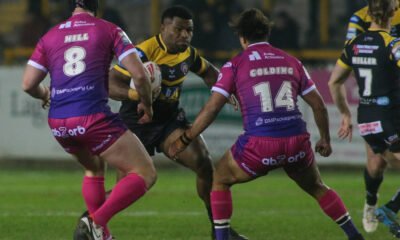
St Helens ground out a win over Huddersfield Giants on Thursday night as they won 14-12 at the John Smith’s stadium.
Leading 12-6 at half time the Saints hung on throughout a second-half in which Huddersfield dominated possession and territory.
In part that was because of the huge number of ‘six again’ restarts that referee Jack Smith called against St Helens and as such Huddersfield had the ball in hand for plenty of time.
A prime example of this was in man of the match Matty Lees made a huge 68 tackles across the game.
During Lees’ post-match interview he references Saints’ ability to defend multiple sets on the bounce, and that was something that Sky pundit Phil Clarke took issue with.
“Maybe when they’re prepared to defend on their own try line, maybe one of the reasons why Huddersfield and other teams can’t score against St Helens is that they’d rather slow down the opposition and concede six more tackles in the belief that, ‘we’ll defend, as long as it’s not quick, we can defend our try line for two minutes’.
“Maybe that’s something that the game’s administrators needs to look at.”
He then further went on to state that St Helens secured victory over Salford in 2022 via similar methods, going as far to label it as “cheating”.
“They played a game last year against Salford at the end where they effectively cheated at the end to win the match in the league match.
“I do think that the game needs to be stricter at penalising sides that are purposefully holding down players or concede penalties or six agains near to their own try line.
“We need to see more yellow cards for that type of behaviour.”
“It is controversial, it is a rule that many would like to see go.”
After the game on social media, former Super League official Richard Silverwood said that the game epitomised why he felt the rule needed to be “scrapped.”
Meanwhile, for a while now Super League coaches have questioned the “consistency” of the decisions.
However, Huddersfield star Ash Golding described the rule as “perfect” on Sky Sports.
“For me I wouldn’t mind me, they are designed for the players who are fit. The rule awards fitter players so that rule for me is perfect,” he said to which Terry O’Connor joked:
“What he means is he doesn’t have to defend in the middle.”
However, Golding does often switching into the number nine role:

More in Super League
-


Hull KR playmaker handed ban on dual-reg duties
Hull KR half-back Ben Reynolds has been handed a two-game ban whilst playing on...
-


Castleford Tigers: Sylvester Namo appeal result confirmed
On Tuesday night, Castleford Tigers found out at an Operational Rules Tribunal that forward...
-


Super League Predictions: Another loss for Leeds Rhinos and a classic in France
After a thrilling break from the Challenge Cup quarter-final, the Super League is back...
-


Reports: Brodie Croft lined up as NRL side’s ‘saviour’
Reports down under have highlighted Leeds Rhinos playmaker Brodie Croft as the potential ‘saviour’...



















